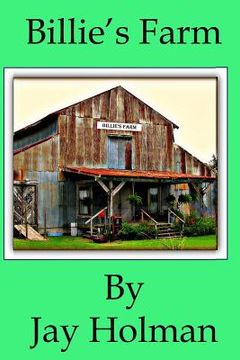Reseña del libro "Billie's Farm: Billie's Farm (en Inglés)"
I lived on a 90-acre farm, with about 35 acres of pasture. The house had a front room, dining room, kitchen, and two bedrooms. The kitchen had a pan for a table and a bucket of water to wash the dishes and prepare food. A wood burning cook stove and some shelves were built for pots, pans, and dishes. The front living room had some chairs, a wood burning stove for heat in the winter and some coal oil (kerosene) lamps for light. The dining room had a table, some chairs, a bench and flour can. If someone visited us, we used the flour can for a chair. There was no electricity. All the lights, stoves and everything else used coal oil, coal, or wood for fuel. There was no refrigerator, so we bought ice at the store and kept it in an icebox to keep it from melting too fast. There was a radio, but it was powered with expensive batteries that didn't last very long, so it was only used for special events. There weren't any bathrooms or running water. To take a bath, water was drawn from the well, carried to the house, then heated on the cook stove and poured into a washtub. Everyone took a bath in the same water. To use the toilet everyone went to the outhouse. Toilet papers were pages torn from a Sears catalog. There was no washing machine or clothes dryer, so my mom heated water outside in a big cast iron pot that had a place for firewood under it. She washed clothes in a washtub with lye soap and a rubbing board, and hung them on a line outside to dry. In the winter, my brother and I would take the wagon, go to the woods, and use the crosscut saw to cut down some trees. The axe was a double bit and both edges were very sharp. One of my chores was to keep the wood box in the kitchen full. One day when I was chopping wood, my little sister walked up behind me. I didn't see her, so when I swung the axe back, it hit her upper lip. She still has a scar. We used the cellar for storing food and for a safe place to go in event of a storm. The house was situated next to a dirt road and about three miles from the store and the school. We did not have a car so we walked to school and to the store. At times when we had eggs or cream to sell, we took the horse drawn wagon. There was a small pond in the pigpen for the pigs to drink water from and an area for them to wallow in the mud. Pigs don't have sweat glands so the mud helped protect them from the weather and flies. Plus they were pigs, so they liked mud. The blacksmith shop had a forge to heat metal so it could be shaped; it used coal for fuel. The billows were used to blow air on the fire to make it hot enough to heat the metal for shaping. There was an anvil (a smooth heavy iron block) to work the hot metal, and tools to handle the hot metal. We sharpened plow points. Shaped horse shoes, repaired tools and to form the metal into other useful things, by heating steel then dipping it into cold water will harden the metal, this makes plow point's last longer and keep and help keep them from bending. The barn had a loft for storing hay, some cribs for corn, and other food for the animals and some stalls for milking the cows. There were mice in the barn, so there was always a cat that lived in the barn. There was a big pond in the pasture for the animals to drink from, and sometimes we hauled water from it to water the garden. I would swim in the pond and take baths there in the summertime. A small creek ran through the pasture but it was mostly dry except when it rained. Wild onions grew near the creek in the springtime. If the milk cows ate the wild onions the milk would smell and taste like onions. We would put the cows that we were milking into a smaller pasture until the wild onions were gone.

